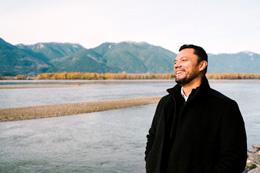BC First Nations buy into Enbridge pipeline

By Sonal Gupta
Local Journalism Initiative Reporter
For decades, a natural gas pipeline has cut through the territories of dozens of First Nations in BC, moving billions of dollars’ worth of gas with zero ownership and little return to the communities.
Now, 36 First Nations have bought in.
“For decades, the nations have watched resources leave their communities with very minimal benefit,” said Justin Napoleon, from Saulteau First Nation and director of Stonlasec8, a newly formed, Indigenous-owned, limited partnership made up of 36 First Nations in BC, including Treaty 8 members.
In a landmark deal announced today, Stonlasec8 revealed its plan to invest approximately $715 million to acquire a 12.5 percent ownership in Enbridge Inc.’s Westcoast natural gas pipeline system that stretches from BC’s remote northeast to the US-Canada border.
“Now, they get to see development in a new light — as something they own, a piece that’s truly part of theirs," Napoleon said.
The deal gives Indigenous communities along the pipeline a direct financial stake in infrastructure on their traditional lands.
“Enbridge brought the opportunity to us,” said David Jimmie, chief of Squiala First Nation and president and chair of Stonlasec8. “I think it signals through industry, and across the country, that these partnerships can be successful — and they can be done.”
A significant step was securing a $400-million loan guarantee from the federal government through an initiative launched in December 2024. This makes the Stonlasec8 investment the first major project supported by the $10-billion federal Indigenous Loan Guarantee Program.
The government program “opens up doors for the nations to access capital and take that step towards economic self-determination,” Napoleon said.
The Westcoast pipeline transports up to 3.6 billion cubic feet of natural gas daily along a 2,900-kilometre route, supplying BC, Alberta, and the US Pacific Northwest.
Through this partnership, Indigenous communities shift from stakeholders to shareholders, gaining a role in co-governing infrastructure on their lands, Jimmie said.
The financial returns from the Westcoast pipeline are slated to be distributed equally among the First Nations in the Stonlasec8 consortium. Each nation will then decide how those funds will be invested in their communities.
“My hope is it’s predictable, long-term, recurring revenue that you can plan around ... You can build that into your community planning as needed, and it’s a reliable source of income,” Napoleon said.
Historically, BC First Nations have faced major financial barriers to resource project ownership. A decade ago, 16 nations in BC were denied a commercial-rate loan for the Pacific Trail Pipeline and settled for a buyout instead of equity.
To Indigenous leaders, this new agreement signals progress, but also exposes the complexities of participation in resource development.
They acknowledge the tension: financial participation brings opportunity, but also binds nations to the risks and responsibilities of fossil fuel infrastructure.
While Stonlasec8’s 12.5 per cent stake marks a significant shift from previous exclusion, it does not translate to a controlling voice on how the pipeline is run or how environmental risks are managed.
“We don't have that power. At 12.5 per cent interest, you're not going to be a major decision-maker in this, but it gets your foot in the door, and you're able to have the conversation, which we couldn't do before,” Jimmie said.
Jimmie said Enbridge and other companies must still adhere to regulatory processes, engage with First Nations, and share environmental assessment findings.
“We still do wear the other hat as rights- and title-holders in the territory,” he said.
John Desjarlais, executive director of the Indigenous Resource Network, an organization that advocates for Indigenous participation and leadership in resource development, said he is thrilled about the partnership.
“There are a lot of good components that could mobilize a good, meaningful development, and shape the policy that we’re going to see into the future,” Desjarlais said.
He said these are not treaty or regulatory arrangements, but business partnerships — separate from government duties of consent or consultation. So legal and financial risks could be shared with Indigenous nations.
“It’s interesting — we talk about oil spills, but now we’d be talking about a nation spilling oil on its own nation, or other nations … affecting its rights and other rights,” Desjarlais said.
In those cases, nations would be held accountable for environmental issues like spills, but the agreements are structured to shift most of the risk to the industry partner, not the investing nation.
“It’s not about transferring risk,” he said. “It’s about transferring wealth — and building opportunities to engage in risk awareness and management. This is why we consider it economic reconciliation.”
Sonal Gupta / Local Journalism Initiative / Canada’s National Observer.









